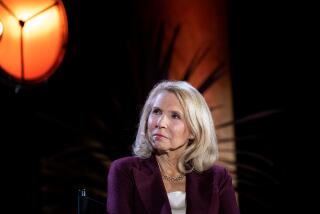Bankruptcy Moves
- Share via
Although he says it’s tearing him up personally, Radisson Hotel developer Carroll Davis’ second go-round with life in bankruptcy court may not be as devastating as it might seem.
Had Davis’ San Diego Diversified Properties not filed for Chapter 11 reorganization and protection from creditors, a foreclosure sale scheduled for Wednesday of the 264-room Radisson--postponed twice before--could have finally become a reality.
More importantly, Davis’ bankruptcy filing could exempt the Radisson from the city’s filing deadline for building permits in Mission Valley. Davis’ plans to build a second hotel tower and a parking garage next to the existing hotel fall under the city’s newly adopted plan to avoid helter-skelter growth in the valley. The filing deadline was Wednesday; Davis filed for bankruptcy last Tuesday.
The likely argument to be advanced goes like this: Davis couldn’t meet the deadline because he was in bankruptcy, which stays all creditor action, lawsuits and, perhaps, building permit deadlines.
It’s the kind of move that has come to symbolize Davis’ approach to business. Even his critics acknowledge that Davis, a former Marine Corps sniper who 13 years ago parlayed his $500 life savings into a multimillion-dollar real estate business, has been gutsy and tireless in his efforts to refinance the hotel’s $27.5 million in defaulted construction loans.
“The guy’s persistent, I’ll say that,” said one adversary.
Radisson, Take 2 . . .
A court-appointed bankruptcy trustee is expected to be named either today or Wednesday.
Local attorney C. Hugh Friedman, who’s had experience running hotel bankruptcies (Nite Lite Inns, for example), has been asked to become the Radisson trustee. But Friedman has been out of town of late and reportedly has not yet accepted or rejected the offer.
Meanwhile, despite the controversy surrounding the Radisson Hotel since its opening 15 months ago, the hotel is nonetheless profitable, according to documents filed in bankruptcy court last week.
In one 10-day period in late June, for example, the hotel generated more than $66,000 in profits on nearly $197,000 in revenue.
Since its opening in June, 1984, the hotel has generated nearly $6.9 million in revenue, the documents showed.
‘Back on Track’?
Normalcy may be returning to financially troubled Central Savings & Loan, where bad news has been the only news in the past year.
The company recently started a modest advertising campaign--a three-phase drive that will run through December and the first multimedia effort since Central killed its $3-million advertising budget a year ago.
The campaign features ads in newspapers and on radio and television. Price tag between now and the end of the year: $1 million.
Central employees were told of the campaign and given the ad scripts earlier this month.
Employee morale also was given a boost Friday, when President and Chief Executive George Leonard gave workers an extra hour of lunch during the Horton Plaza opening festivities.
Leonard said he mulled the decision carefully because of a push for increased productivity but concluded that the extra hour would do wonders for employee attitudes.
It apparently has.
“My staff was thrilled,” said one senior executive. “Everybody feels like we’re back on track again.”
Do Not Disturb
William McElroy and his wife, Marlene, left Saturday for the International Conference on Biochemistry in Copenhagen, part of a three-week tour of Europe.
The McElroys were on vacation a year ago this month in Florence, Italy, when he received a hurried phone call from fellow directors at Sun Savings & Loan telling him that a special board meeting was being held right then and he was needed to make a quorum.
That call--placed at 12:30 a.m., Italy time--not only awoke McElroy but set off a buzz saw of controversy that ended with the eventual ouster of Chairman Daniel W. Dierdorff.
Mindful of the role that that phone call played in the ensuing year at Sun, McElroy, now Sun’s chairman, admonished company officials that “I didn’t want any telephone calls from Sun on this trip.”
How’s That Again?
The proposal that Walker Scott shareholders approved last week seems straightforward enough. Ownership of the old-line San Diego company, which operates 12 department stores in Southern California, will transfer to a group of private investors led by Harold Kapelovitz, owner of Desmond’s Inc., which sells men’s and women’s apparel.
But the technical legalese is anything but straightforward: The deal actually is “a triple triangular merger without a cram-down.”
One wonders if, had they heard that description, the shareholders would have approved such a drastic step.
More to Read
Inside the business of entertainment
The Wide Shot brings you news, analysis and insights on everything from streaming wars to production — and what it all means for the future.
You may occasionally receive promotional content from the Los Angeles Times.










